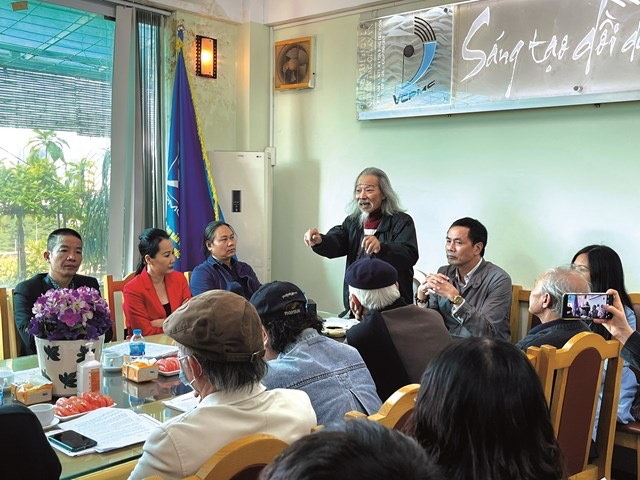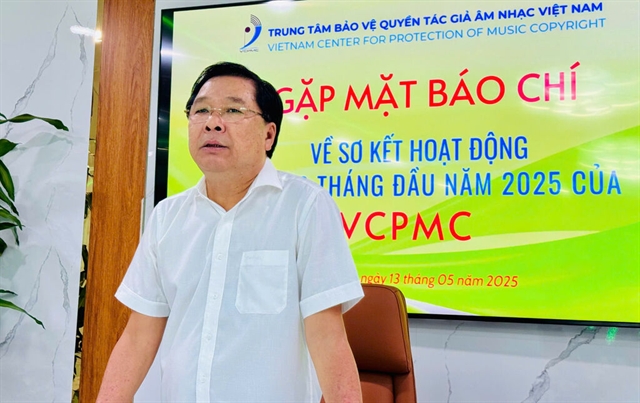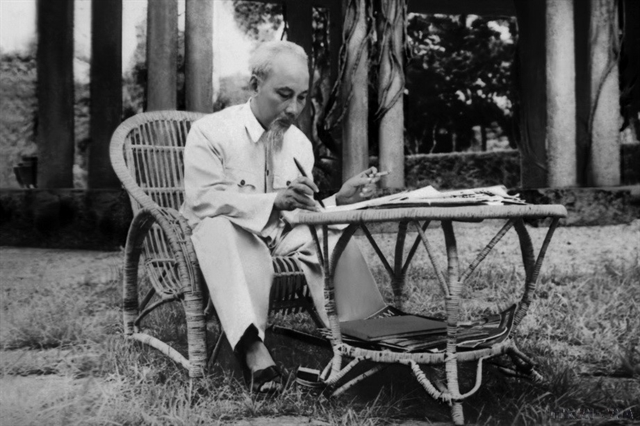 Life & Style
Life & Style

 |
| A copyright issue occurring between musician Đỗ Hiếu (left) and singer Noo Phước Thịnh once raised controversy in the music community. Photo vcpmc.org |
The rapid development of digital technology has been creating profound shifts in the entire value chain of the global music industry, from creation and production to distribution and consumption, experts have said.
However, along with the wide-open opportunities, the digital environment also poses many complex challenges to music copyrights protection, especially in the context of the development of online platforms and artificial intelligence.
Phạm Thị Kim Oanh, deputy director general of the Việt Nam Copyright Office (VNCO), analysed the legal status and enforcement mechanism of music copyrights in the country in an article published recently on the VNCO's website.
"In the context of a rapidly developing knowledge economy, copyright protection for music is not only a legal institution protecting the legitimate rights and interests of authors, performers and producers, but also plays a key role in promoting creativity, investment and sustainable development of the cultural industry," she said.
"Copyright protection for music is the bridge between art and the market, between individual creativity and economic value."
The expert also made a number of recommendations to build a creative, fair and sustainable music ecosystem in the digital age.
According to the latest report from the International Federation of the Phonographic Industry, global music revenue in 2024 reached US$29.6 billion, an increase of 4.8 per cent compared to 2023.
Of which, online music listening services account for around 70 per cent of total revenue, showing the increasingly dominant role of the digital environment in the music industry.
"This means that copyrights protection is no longer simply a traditional legal issue, but has become a vital condition for promoting a modern, transparent and creative music industry," Oanh said in her article.
For the current situation of music copyright in Việt Nam, she praised the legal framework was gradually being improved due to important progress in the efforts to build and enhance copyright laws in the online environment.
"Not only making efforts to internalise international commitments, Việt Nam is also actively participating in many bilateral and multilateral conventions and agreements related to copyright," she said.
 |
| Musicians during a working session with VCPMC regarding copyright infringement. Photo courtesy of VCPMC |
To date, the country is a member of eight important international treaties, which include the Rome, Geneva and Brussels conventions, and recently the Marrakesh Treaty.
"This not only creates new advantages for Vietnamese musical works to be protected abroad, but also forces Việt Nam to comply with international standards on copyright protection," Oanh said.
"In addition, participation in free trade agreements has promoted institutional reform, while expanding the ability to cooperate in the enforcement of intellectual property rights in the digital space."
However, in the context of increasingly complex copyright infringements, law enforcement still faces many difficulties, requiring close coordination between management agencies, enforcement agencies, international service providers and rights holders themselves, according to the VNCO official.
Outstanding complexities
The digital age has both opened up great opportunities for the music industry and created risks of copyright infringement with increasingly sophisticated scale and nature.
One of the most enduring challenges is the explosion of digital platforms. Although these are important distribution channels for modern music, the identification of copyright owners, licensing and collection of royalties have not been effectively implemented.
In addition, forms of infringement such as unauthorised remixes, unauthorised replays and use of voices for deepfake or background music of unknown origin are increasing at a dizzying rate. The lack of copyright identification tools such as content ID, watermarking or blockchain also makes the process of detecting and handling violations difficult.
Moreover, a large number of users still do not have the awareness to respect copyrights, while the complaint handling system and legal sanctions are not strong enough to deter infringements.
 |
| General Director of the VCPMC Đinh Trung Cẩn said that in the first quarter, the centre collected more than VNĐ90 billion in royalties. Photo courtesy of VCPMC |
According to a report by the Việt Nam Centre for Protection of Music Copyrights (VCPMC), an organisation that performs the function of collective management of copyrights in the music field, by 2024, more than 6,500 domestic authors authorised the VCPMC to collect music copyright fees.
The total amount of royalties for music works collected in 2024 by the centre reached VNĐ393 billion (US$15.17 million), of which 78 per cent came from the digital field.
 |
| The digital environment poses complex challenges to music copyright protection. Illustration photo nbtv.vn |
The VCPMC has constantly intensified the handling of violations and accelerated copyright infringement lawsuits.
Đinh Trung Cẩn, the centre's general director, said that in the first quarter of 2025, the centre collected more than VNĐ90 billion of royalties. It also distributed about VNĐ85 billion in music royalties to its member authors, of which one musician received music royalties of more than VNĐ1 billion.
Cẩn said that recently more users had been aware of asking for permission from the music owners. However, some performance organisers still evaded and had not voluntarily agreed to pay royalties, while many users of online music works still tried to evade and did not cooperate with copyright protectors.
To cope with the situation, the centre stepped up the handling of violations, accelerated lawsuits to handle infringement and claim compensation for damages in the fields of performance, broadcasting, communication and especially online copying due to many YouTube channels infringing the copyright laws.
As of early May, 400 more musicians had authorised the VCPMC to collect music copyright fees. In particular, many young musicians and authors had registered to become members of the centre.
"This strongly suggests that the VCPMC is increasingly affirming its position as a trusted address for generations of musicians and authors," said Cẩn.
In 2025, the centre would strive to collect about VNĐ500 billion in music royalties for members, an increase of more than VNĐ100 billion compared to 2024. VNS




